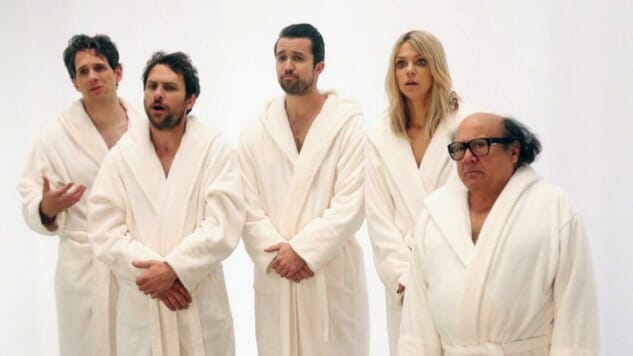Now’s the Time for It’s Always Sunny in Philadelphia to Look to the Future

In the beginning, It’s Always Sunny in Philadelphia was the little show that could. A few friends made a pilot that got them on FX, and, after some missteps and a bit of slow going out of the gate, it turned into a cult favorite. It’s Always Sunny has always been, in essence, a raunchier version of Seinfeld, but it’s also grown into so much more in the ensuing years. The series built its own world, which was on grand display in the 11th season of the show, which recently came to an end with “The Gang Goes to Hell: Part Two.”
Eleven seasons and 124 episodes is an impressive achievement for any show, let alone a show with such humble beginnings. And the gang has at least one more season on the docket. However, the longer a series runs, the more difficult it becomes to really hold onto your audience, and to create notable, entertaining television. This is particularly true of It’s Always Sunny, a show that has thrown everything against the wall from the very beginning. At this point, they can’t really heighten things anymore, because they’ve already stretched the limits of what they can do, and what can be shown on basic cable.
On the other hand, building a world, and a devoted fan base, can have its advantages, and that was the case for this 11th season, which was a particularly inward-looking, fan service-y season of television. It was a season built on callbacks; it was all about knowing these characters, and their world well enough to get the jokes. Basically, season 11 functioned as a reward to fans for watching all these years.
Well, it was sort of a reward.
The very first episode was another outing of Chardee MacDennis, the bizarre, disturbing game the gang created, and played, in a previous episode. Then, in the second episode, Frank fell out of a window, and thought it was 2006. At this point, the show started going back through old plots, and other characters started behaving the way they did when Frank first joined the show. Dee and Dennis got back on crack, we saw the old strip club. It was a modern twist on an old classic. These two episodes set the tone for the entire season.
-

-

-

-

-

-

-

-

-

-

-

-

-

-

-

-

-

-

-

-

-

-

-

-

-

-

-

-

-

-

-

-

-

-

-

-

-

-

-

-








































